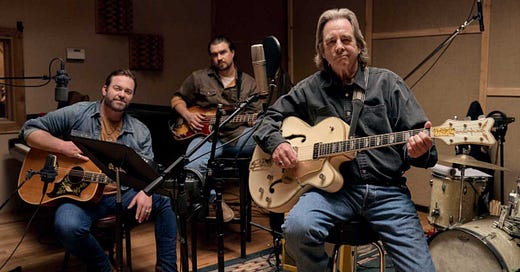The Neon Highway
Beau Bridges follows brother Jeff along the trail of a broke-down country singer who stumbles across one last chance at making himself heard.
Jeff Bridges had a pretty good turn as a boozy, broke-down and washed-up country singer in “Crazy Heart,” netting him an Oscar win. Now his brother Beau is following in similar bootsteps 15 years later in “The Neon Highway.”
Shot in Georgia with settings there and in Nashville, it’s an earthy and evocative tale of the fictional Claude Allen, a once-legendary crooner who’s now fallen down a lonesome path. Part of that was due to changing times and sounds — he’s more Merle Haggard than Morgan Wallen — but also his tendency for drinking and, not unrelatedly, pissing off all his friends and collaborators.
It’s directed by William Wages, who has a great country song name and spent most of his career as a cinematographer for documentaries and such, and also wrote the screenplay along with Phillip Bellury. It’s a movie that wears its heart proudly on its sleeve, has a nice organic look — as you might expect from a veteran camera guy — but also hits a few sour chords with some amateurish scenes and acting.
The centerpiece is Bridges, and the main reason to watch. When we first meet him he’s just another over-the-hill Georgia good ol’ boy, shuffling about a rickety shack in his undershirt — hairy, gray and uncouth. The place used to belong to his parents and now is the only thing in the world he owns, apart from the original White Falcon guitar (pronounced GIH-tar) that was his onstage totem.
Claude will tell anyone who recognizes him he’s done with music and the music industry is done with him, and he’s just fine with that. But as soon as he hears a tuneful noise he thinks he can ride back into Nashville’s good graces, he cleans up his act lickety split — even dying his long silver hair.
It’s a terrific piece of acting by Bridges, who has occasionally performed alongside his kid brother, enjoying a busy if decidedly lower-profile career. He plays Claude as a back-slapper and whiskey-swilling charmer, a guy so inside his own head he doesn’t have a clue how out of touch he is.
He think he can ring up his old buddies at the record labels and waltz right back into the show, even though most of them have retired, folded or died. The hip young girls working the corporate front desks roll their eyes at his parade of “darlins” and “willyas.”
Claude is headed for a big fall, there’s no doubting. And this story is about tailing along with him for a front-seat view of that bitter ride.
He’s not really the main character, though. That’s Wayne Collins (Rob Mayes), a guy who came close to making it in the country music biz 15 years ago or so but was beset by tragedy and estrangement from his brother-partner, Lloyd (T.J. Power). Now he’s barely scraping by as a telecommunications installer, married happily but fretfully to Ginny (Jennifer Bowles), with whom he has two kids, including a son about to go off to a (expensive) college program.
He and Lloyd wrote the titular song a long time ago, but Wayne has barely held a guitar in years. When he’s sent out to Claude’s place to hook up his cable, the old feller teases him into picking out a few bars. His eyes instantly twinkle with promise. He gives Wayne a few tips to improve the song, and offers to head to Nashville to record it, going 50-50 partners.
The rest of the movie is a combination road show and character study, focusing on these two guys who love music with all their heart and soul, but also know from long nights of pain what it costs to make it, or stay there.
The tough truth is that every moment Bridges is onscreen is pure, harmonious delight. And most moments he’s not feel like something spat out as a made-for-TV movie for CMT… and not the top-drawer stuff.
Mayes isn’t given a lot to do by the script other than stew and glare. Wayne is swept up by Claude’s enthusiasm and one last shot at the big time before mortgages and middle age swallow up the last scraps of his dreams. But he quickly figures out that the old-timer is more showboater than real McCoy these days.
Claude can get you in the door, but also ushered out of it spit-quick.
We meet Pepper (Sandra Lee-Oian Thomas), an old flame of Claude’s now running a downtrodden motel on the outskirts of Nashville along with her fella, Ray (Sam Hennings), who was one of many to walk in and out of his shadow as part of the band over the years. They’re tickled to see him, offering to house him and Wayne for free while they make their pitch, though old troubles soon follow in Claude’s shadow.
That’s the sort of guy Claude is: you feel real happy to see him when he turns up, until he sticks around long enough for you to remember why he left.
Bridges’ singing is pretty decent, vocally portraying Claude as more of a croaker than a balladeer, a voice roughened up by years and hooch. The lead song, which Claude adopts as an ode to all the honky-tonks he’s played over the years, is good enough to leave us wanting more. Mays sings his own stuff and has legit countrified pipes.
There’s much to admire about “The Neon Highway,” with Bridges achingly portraying an old guy resting his hump on a pile of regrets, and then plucking up the courage to give it one more go. If the movie had trained its sights straight at him and tuned out all the other stuff, we’d have had a hit on our hands.
“The Neon Highway” begins a limited theatrical run March 15.





